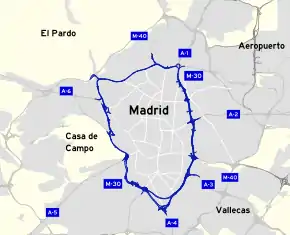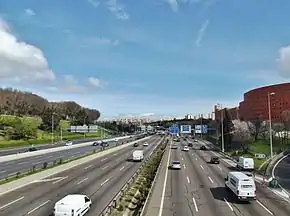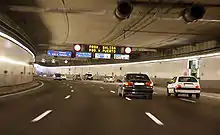Autopista de Circunvalación M-30
The M-30 orbital motorway circles the central districts of Madrid, the capital city of Spain. It is the innermost ring road of the Spanish city, with a length of 32.5 km. Outer rings are named M-40, M-45 and M-50.
| |
|---|---|
 | |
 | |
| Route information | |
| Length | 32.5 km (20.2 mi) |
| Location | |
| Major cities | Madrid |
| Highway system | |
| Transport in the Community of Madrid | |
It has, at least, three lanes in each direction, supplemented in some parts by two or three lane auxiliary roads. It connects to the main Spanish radial national roads that start in Madrid.
The M30 is the busiest Spanish road, famous for its traffic jams, and surrounded by several landmarks such as Torrespaña (one of the tallest structures in Madrid), the national headquarters of IBM, and passed under the Vicente Calderón Stadium.
Its construction started in the 1960s and required the underground canalisation of the Abroñigal river, required to avoid flooding since the road runs through the lowest part of the city. In the 1970s the most important section was open between the junction of Manoteras (cross with the A-1, M-11 and accesses to Sanchinarro) and the Nudo Sur (South Junction), that connects to the Avenida de Andalucia (previously N-IV) and A-4.[1]
In the 1990s, the ring road was completed with the construction of the section between Avenida de la Ilustración (the only section of the road with traffic lights) and the junction of Puerta de Hierro (accession to Cardenal Herrera Oria street, M40, and El Pardo road).[1][2]
From 2005 to 2008, major upgrading works took place, and now a significant portion of the southern part runs underground. They are the longest urban motorway tunnels in Europe, with sections of more than 6 km in length and 3 to 6 lanes in each direction, between the south entry of the Avenida de Portugal tunnel and the north exit of the M-30 south by-pass there are close to 10 km of continuous tunnels. The M30 tunnels run between a point roughly 700 meters north of the junction with A5 motorway and continue all the way up to the junction between M30 and A3 motorway.
Multimedia Gallery
 M-30 North
M-30 North M-30 East
M-30 East Underground stretch of the M-30
Underground stretch of the M-30 M30 passing under the north side of the Vicente Calderón Stadium (currently demolished)
M30 passing under the north side of the Vicente Calderón Stadium (currently demolished)
Exit list
The M-30 has the following exits:[3]
| # | Destinations | Notes |
|---|---|---|
| Via de Servicio - Centro Comercial, Sanchinarro, Las Tablas | ||
| 2 | ||
| 1 | Avenida Monforte de Lemos, Calle de Sinesio Delgado, Avenida de Burgos, Avenida de Pío XII – Estación de Chamartín | |
| 3 | Calle de Serrano Galvache, Avenida de San Luis | Counterclockwise exit and entrance |
| 4B | Plaza Castilla | Counterclockwise exit and clockwise entrance |
| 4A | Calle de Arturo Soria | Counterclockwise exit and entrance |
| 2 | Calle de Costa Rica – Plaza de José María Soler | Signed as exit 5 counterclockwise |
| 3 | Avenida de Ramón y Cajal – Palacio de Congresos de Madrid | Signed as exit 6 counterclockwise |
| 4A | Avenida de América, Calle de Serrano | Signed as exit 7 counterclockwise |
| 4B | Signed as exit 7 counterclockwise | |
| 5 | Parque de las Avenidas | Clockwise exit and entrance |
| 8 | Calle de la Salvador de Madariaga – Tanatorio | Counterclockwise exit and entrance |
| 6 | Calle de Alcalá – Plaza de Cibeles | No counterclockwise exit |
| 7 | Avenida Marqués de Corbera, Calle de O'Donnell – Puerta de Alcalá | Clockwise exit and counterclockwise entrance |
| 8 | Clockwise exit and counterclockwise entrance | |
| 9 | ||
| 10 | Calle de Estrella Polar, Calle de Sirio | Clockwise exit and counterclockwise entrance |
| 11 | Plaza Conde de Casal – Parque del Retiro | Clockwise exit and counterclockwise entrance |
| Avenida Ciudad de Barcelona, Avenida de la Albufera – Estación de Atocha | Clockwise exit and counterclockwise entrance | |
| To A-4 / A-42 / Calle de Méndez Alvaro – Córdoba, Toledo | ||
| Glorieta Pirámides, Glorieta Marqués de Vadillo | ||
| Paseo de la Ermita del Santo | Counterclockwise exit and entrance | |
| 17 | Paseo de la Virgen del Puerto, Calle de Segovia, Paseo de Extremadura – Casa de Campo | |
| 18 | ||
| Calle de San Pol de Mar | Clockwise exit and entrance | |
| Calle Santa Fe | Clockwise exit and entrance | |
| 20A | Avenida Valladolid, Paseo del Pintor Rosales | Signed as exit 20 counterclockwise |
| 20B | Signed as exit 20 counterclockwise | |
| C.P. Agronomos Facultades de Filologia y Estadistica | ||
| 23A | No clockwise exit | |
| 23B | Signed as exit 23 clockwise | |
| 23 | Calle de Sinesio Delgado | No counterclockwise exit |
| Calle de Arroyofresno, Avenida Ventisquero de la Condesa | Clockwise exit and counterclockwise entrance | |
| Clockwise exit and counterclockwise entrance | ||
| No clockwise exit | ||
| Calle de Cantalejo, Avenida de Miraflores, Avenida Los Pinos, Calle del Dr. Ramón Castroviejo | ||
| Avenida Ventisquero de la Condesa | ||
| Gap in freeway | ||
| Paseo de la Castellana, Plaza Castilla – Hospital Universitario La Paz | Counterclockwise exit not accessible from other end of M-30 | |
| 31B | V. Begona – Fuencarral | Counterclockwise exit and entrance |
References
- Nuño, Ada. "Los orígenes de la M-30: curiosidades de la autopista que salvó a Madrid del 'reventón'". elconfidencial.com. El Confidencial. Retrieved 6 December 2020.
- "La M-30, una autopista con historia. (Parte IV)". madridmobiite.com. Madridmobilite.com. Retrieved 6 December 2020.
- "Salidas de la M-30: ¿cuántas hay y con qué carreteras conectan?". emesa-m30.es. EMESA 30. Retrieved 6 December 2020.
